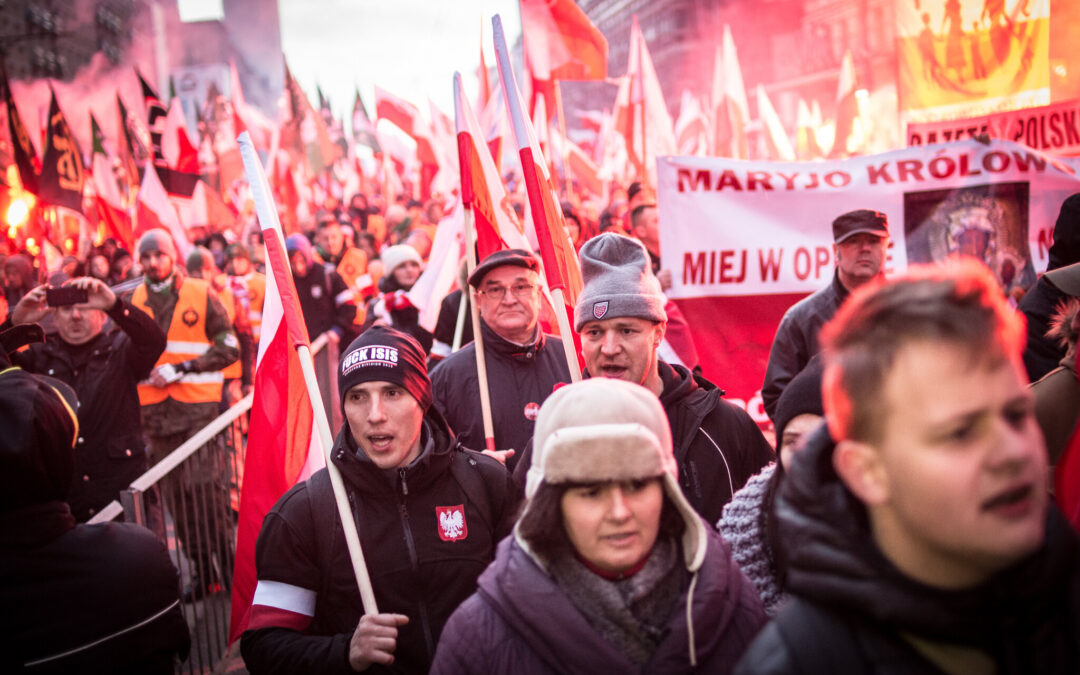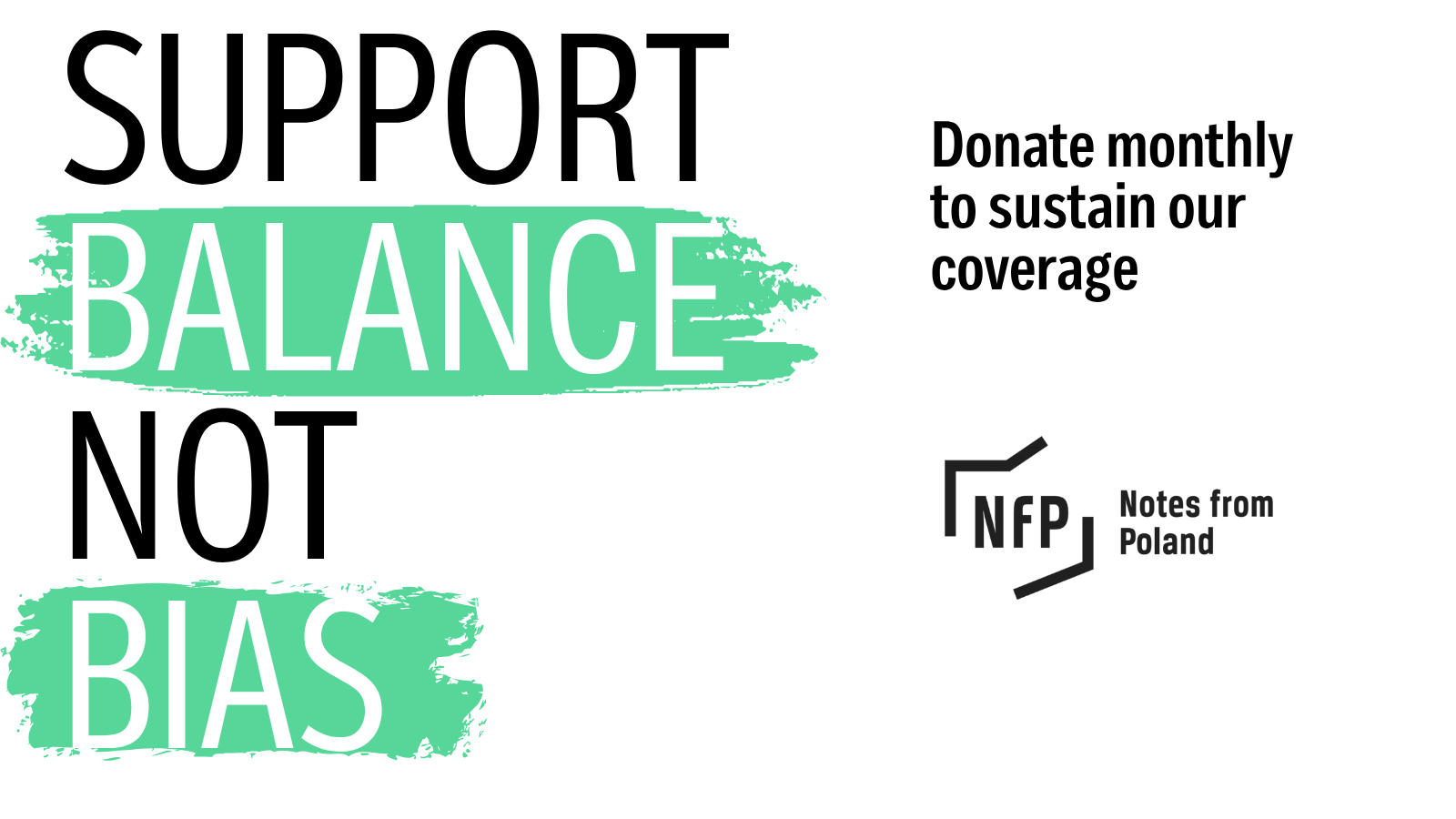Keep our news free from ads and paywalls by making a donation to support our work!

Notes from Poland is run by a small editorial team and is published by an independent, non-profit foundation that is funded through donations from our readers. We cannot do what we do without your support.
Poland’s recently elected president, Karol Nawrocki, has confirmed that he will attend Tuesday’s Independence March, which is organised annually by nationalist groups in Warsaw to celebrate Poland’s Independence Day.
Though the event was established by the far right, it now draws a broad range of participants, from mainstream conservatives to radical nationalists. While some years have witnessed violent clashes between marchers and police, others have passed without major incident.
Nawrocki’s predecessor, Andrzej Duda, did not attend the event during his decade as president, with the exception of 2018, when a larger march was co-organised with the then government to mark the centenary of Poland regaining independence after World War One.
Do zobaczenia na Marszu Niepodległości! 🇵🇱 pic.twitter.com/7TvlbZ5VI6
— Karol Nawrocki (@NawrockiKn) November 8, 2025
In a video posted on social media on Saturday, Nawrocki – who has previously attended the march while serving as head of the state Institute of National Remembrance (IPN) – confirmed that this year he would take part as president.
“Polish patriots from all over the country come to the capital to celebrate independence, holding the white and red [Polish flag] in hand, and to show their unity and love for their homeland, above all divisions,” said Nawrocki.
“This is a great opportunity to send a positive signal to the entire world that Poles are united, proud, and determined to build a great Poland,” he continued. “Let’s all meet, as we do every year, on 11 November at the Independence March in Warsaw. See you there!”
The Independence March was founded 15 years ago by two far-right groups, National Radical Camp (ONR) and All-Polish Youth (MW), and during its early years regularly witnessed disorder.
The event is now organised mainly by the National Movement (Ruch Narodowy), which is part of the far-right Confederation (Konfederacja) group that sits in Poland’s parliament.
The municipal authorities in Warsaw – which has since 2006 been ruled by the centrist Civic Platform (PO) party – have periodically tried to ban the march, including last year as well as in 2020 and 2021. However, the organisers have always found ways to evade such prohibitions.
There was violence at today's Independence March in Warsaw, as participants attacked police and set fire to an apartment in a building where an LGBT flag was hanging.
Police also used force against members of the press, leaving one with serious injuries https://t.co/tJ7VxbKnUX
— Notes from Poland 🇵🇱 (@notesfrompoland) November 11, 2020
PO’s main rival, the national-conservative Law and Justice (PiS) party, has had mixed relations with the march. PiS leaders have generally expressed support for the event, and blamed disorder on “provocateurs”. But they also long chose not to actually attend.
However, as the event has become bigger – sometimes drawing over 100,000 participants – and more popular with mainstream conservatives, PiS’s approach has shifted. Last year, its leader, Jarosław Kaczyński, attended for just the second time and he plans to do so again this year.
The previous time that Kaczyński and other leading PiS figures attended was for the 2018 independence centenary, when the then PiS government and the nationalist organisers of the march cooperated to put on a joint event that drew a record 250,000 participants.
That year was also the only time that Duda – who, like Nawrocki, is aligned with PiS – attended the march.
The annual nationalist Independence March – the first under the new, more liberal government – has passed through Warsaw without any major incidents.
City hall estimates that 90,000 people took part, but the organisers claim attendance was 250,000 https://t.co/jsiYN3SjmB
— Notes from Poland 🇵🇱 (@notesfrompoland) November 11, 2024
In December 2023, PiS was replaced in government by a more liberal coalition led by PO. Its leaders are critical of the Independence March and do not attend, instead celebrating Independence Day at other public events.
Poland’s current prime minister, Donald Tusk, called the Independence March a “reputational disaster” for Poland in 2017, when he was president of the European Council.
In 2021, when leader of the opposition, Tusk called it a “march of shame” organised by “people who are transforming Polish patriotism into the most brutal version of Polish nationalism”.
Last year, with Tusk now in power, police conducted raids of properties linked to the Independence March, including its headquarters. Prosecutors said that the searches were part of an investigation into reported violent threats and hateful chants by participants in the march.
Opposition leader Jarosław Kaczyński has condemned police searches of properties linked to the annual Independence March.
He claims that it is "an attempt to pacify a country that is to be deprived of independence" and brought under foreign rule https://t.co/avJc6tYw4e
— Notes from Poland 🇵🇱 (@notesfrompoland) September 5, 2024

Notes from Poland is run by a small editorial team and published by an independent, non-profit foundation that is funded through donations from our readers. We cannot do what we do without your support.
Main image credit: TG Sokół Lublin/Flickr (under CC BY-NC-SA 2.0)

Daniel Tilles is editor-in-chief of Notes from Poland. He has written on Polish affairs for a wide range of publications, including Foreign Policy, POLITICO Europe, EUobserver and Dziennik Gazeta Prawna.




















